Email: dgacmad@acmad.ne/dgacmad@acmad.org site web: www.acmad.net
The Regional Climate Outlook Forums (RCOFs) have been operational in many parts of the world with the aim to develop and provide consensus-based climate outlooks and related impacts, preparedness and response information on a regional scale. These activities support decision making to manage climate-related risks and support sustainable development. This process was initiated by WMO’s Climate Information and Prediction Services (CLIPS) project, in collaboration with National Meteorological and Hydrological Services (NMHSs), regional/international climate centres among many other partners. RCOFs have been recognized to be prominent among the key regional mechanisms to support the implementation of the Global Framework for Climate Services (GFCS), Sendai Framework for Disaster Risk Reduction and Sustainable Development Goals.
IOC members share common geographical and climatic features such as small Islands (except Madagascar), sharp topography, maritime influence, tropical extreme weather events such as torrential rainfall or cyclones, and a similar seasonal cycle typical of the Southern Hemisphere. Due to these geographical and climactic similarities, the IOC members also share a number of concerns and issues in terms of vulnerability to climate variability and climate change. Understanding regional and local climate including teleconnections with large-scale variability, assessing predictability and facilitating tailoring and application of climate information are among the challenges facing the region.
The idea of a regional forum for jointly developing seasonal climate outlooks dedicated to the countries of the South-West Indian Ocean is not new. The interest and feasibility of such a forum was a regular topic for discussion in the regional workshops organized within ACCLIMATE project on the adaptation of IOC countries to climate change: www.acclimateoi.net.
The workshop held in Saint-Denis de La Réunion at Météo-France (27-30 September 2011) in the framework of ACCLIMATE project led to the organization of a first South-West Indian Ocean Climate Outlook Forum (SWIOCOF) in September 2012. In the absence of sustained financial support and clear governance, SWIOCOFs could not be regularly organized, although it was unanimously agreed that SWIOCOF was of great benefit to the South-West Indian Ocean countries/territories.
In parallel, in June 2012, the African Center of Meteorological Application for Development (ACMAD) held in Moroni, Comoros, a “scoping workshop on seasonal forecasting of cyclone activity in the South-West Indian Ocean region, for climate risk management and adaptation to climate change for sustainable development”. This workshop was followed by two RCOFs in October 2013 and January 2016. In addition, two longstanding RCOFs, namely the Southern African Climate Outlook Forum (SARCOF) and the Greater Horn of Africa Climate Outlook Forum (GHACOF) also extend their scope to conditions in the adjoining Indian Ocean, though their main focus is on the continental climate. However, participants representing the SouthWest Indian Ocean countries/territories in these forums have indicated that, due to the geographic and climatic specificities of the South-West Indian Ocean region, the applicability of forums targeted at the broader sub-regions is limited.
The RCOF
The RCOF started in 2012 with a scoping workshop. It is typically held once a year in October with November-December-January and December-January-February as target seasons for precipitation and November to April of the following year as target season for tropical cyclone. It involves Mauritius, Comoros, Seychelles, La reunion, Madagascar, Tanzania, Mozambique and South Africa. National Meteorological and Hydrological services of the region, WMO Global Producing Centres for Long Range Forecasts, are the major collaborating partners.
 |
 |
Figure: seasonal precipitation forecasts for the South West Indian Ocean region.
|
User involvement
Users from health, trade, agriculture, water, disaster management and media communities are invited to the forum for exchanges, interactive discussions on the historical, current and expected climate conditions, related impacts, advices and recommendations for these sectors.
 |
Figure : Participants at the 2nd South West Indian Ocean Regional Climate Outlook Forum, October 28-November 01, 2013 in Antananarivo-Madagascar. |
Way forward
Indian ocean-atmosphere interactions and modeling, new predictors for statistical forecasting tools, local and regional climate variability and trends studies, assessment of regional performance of forecasting systems including their strengths and weaknesses in predicting the tropical Indian ocean SSTs, QBO and other features modulating significantly regional climate variability are proposed to improve consensus outlook products. Specifically better understanding and prediction of the subtropical Indian Ocean Dipole, the southern Annular Mode and troposphere-stratosphere interactions including processes by which they modulate seasonal tropical cyclone activity and precipitation are required.
Participation of climate service providers of the region in tourism sector forums, contingency planning meetings, agriculture season planning workshops, vulnerability assessment, and water forums or projects is to be supported for awareness raising, advocacy, effective exchanges, interactions and consensus building on sector relevant impacts, adaptation measures, advices and recommendations. Provision of more local climate outlook is needed for small island states of the region.
Click here to see the RCOFS Concept General